
Robert Anson Heinlein was an American science fiction author, aeronautical engineer, and naval officer. Sometimes called the "dean of science fiction writers", he was among the first to emphasize scientific accuracy in his fiction, and was thus a pioneer of the subgenre of hard science fiction. His published works, both fiction and non-fiction, express admiration for competence and emphasize the value of critical thinking. His plots often posed provocative situations which challenged conventional social mores. His work continues to have an influence on the science-fiction genre, and on modern culture more generally.
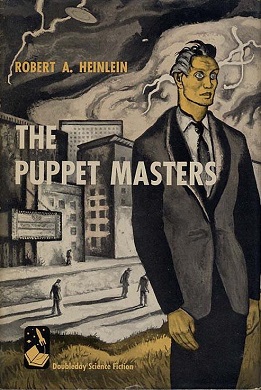
The Puppet Masters is a 1951 science fiction novel by American writer Robert A. Heinlein, in which American secret agents battle parasitic invaders from outer space. It was originally serialized in Galaxy Science Fiction.

Between Planets is a juvenile science fiction novel by American writer Robert A. Heinlein, originally serialized in Blue Book magazine in 1951 as "Planets in Combat". It was published in hardcover that year by Scribner's as part of the Heinlein juveniles.

Stranger in a Strange Land is a 1961 science fiction novel by American author Robert A. Heinlein. It tells the story of Valentine Michael Smith, a human who comes to Earth in early adulthood after being born on the planet Mars and raised by Martians, and explores his interaction with and eventual transformation of Terran culture.

Friday is a 1982 science fiction novel by American writer Robert A. Heinlein. It is the story of a female "artificial person", the eponymous Friday, genetically engineered to be stronger, faster, smarter, and generally better than normal humans. Artificial humans are widely resented, and much of the story deals with Friday's struggle both against prejudice and to conceal her enhanced attributes from other humans. The story is set in a Balkanized 21st century, in which the nations of the North American continent have been split up into a number of smaller states.
" '—All You Zombies—' " is a science fiction short story by American writer Robert A. Heinlein. It was written in one day, July 11, 1958, and first published in the March 1959 issue of The Magazine of Fantasy & Science Fiction after being rejected by Playboy.
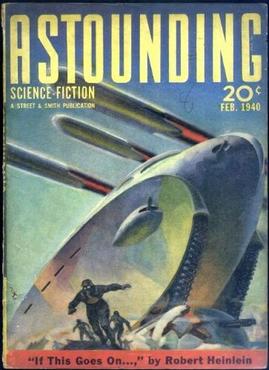
"If This Goes On—" is a science fiction novella by American writer Robert A. Heinlein, first serialized in 1940 in Astounding Science-Fiction and revised and expanded to novel length for inclusion in the 1953 collection Revolt in 2100. The story shows what might happen to Christianity in the United States with mass communications, applied psychology, and a hysterical populace. The story is part of Heinlein's Future History series.
"The Green Hills of Earth" is a science fiction short story by American writer Robert A. Heinlein. One of his Future History stories, the short story originally appeared in The Saturday Evening Post, and it was collected in The Green Hills of Earth. Heinlein selected the story for inclusion in the 1949 anthology My Best Science Fiction Story. "The Green Hills of Earth" is also the title of a song mentioned in several of Heinlein's novels.
"The Long Watch" is a science fiction short story by American writer Robert A. Heinlein. It is about a military officer who faces a coup d'état by a would-be dictator.
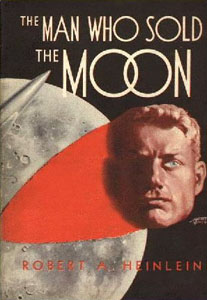
The Man Who Sold the Moon is a science fiction novella by American author Robert A. Heinlein, written in 1949 and published in 1950. A part of his Future History and prequel to "Requiem", it covers events around a fictional first Moon landing in 1978 and the schemes of Delos D. Harriman, a businessman who is determined to personally reach and control the Moon.

The Green Hills of Earth is a collection of science fiction short stories by American writer Robert A. Heinlein, published in 1951, including short stories published as early as 1941. The stories are part of Heinlein's Future History. The title story is the tale of an old space mariner reflecting upon his planet of birth. According to an acknowledgement at the beginning of the book, the phrase "the green hills of Earth" is derived from a story by C. L. Moore.

Time Enough for Love is a science fiction novel by American writer Robert A. Heinlein, first published in 1973. The book made the shortlist for the Nebula, Hugo and Locus awards for best science fiction novel of that year, although it did not win. It did win a retrospective Libertarian Futurist Society award: the Prometheus Hall of Fame award for 1988.
Sexual themes are frequently used in science fiction or related genres. Such elements may include depictions of realistic sexual interactions in a science fictional setting, a protagonist with an alternative sexuality, a sexual encounter between a human and a fictional extraterrestrial, or exploration of the varieties of sexual experience that deviate from the conventional.
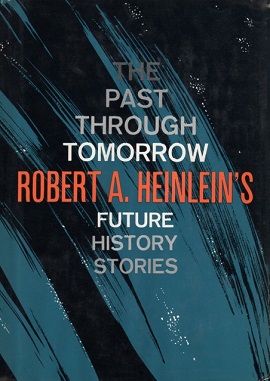
The Past Through Tomorrow is a collection of science fiction stories by American writer Robert A. Heinlein, first published in 1967, all part of his Future History.
"Gulf" is a science fiction novella by American writer Robert A. Heinlein, originally published as a serial in the November and December 1949 issues of Astounding Science Fiction and later collected in Assignment in Eternity. It concerns a secret society of geniuses who act to protect humanity. The novel Friday, written in 1982, was loosely a sequel.
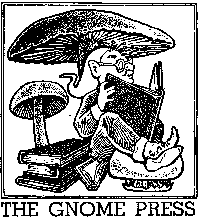
Gnome Press was an American small-press publishing company active 1948 – 1962 and primarily known for fantasy and science fiction, many later regarded as classics.
The science fiction writer Robert A. Heinlein (1907–1988) was productive during a writing career that spanned the last 49 years of his life; the Robert A. Heinlein bibliography includes 32 novels, 59 short stories and 16 collections published during his life. Four films, two TV series, several episodes of a radio series, at least two songs and a board game derive more or less directly from his work. He wrote the screenplay for Destination Moon (1950). Heinlein also edited an anthology of other writers' science fiction short stories.
The Heinlein juveniles are the science-fiction novels written by Robert A. Heinlein for Scribner's young-adult line. Each features "a young male protagonist entering the adult world of conflict, decisions, and responsibilities." Together, they tell a loosely connected story of space exploration. Scribner's published the first 12 between 1947 and 1958, but rejected the 13th, Starship Troopers. That one was instead published by Putnam. A 14th novel, Podkayne of Mars, is sometimes listed as a "Heinlein juvenile", although Heinlein himself did not consider it to be one.
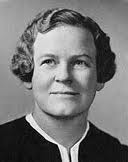
Alice Dalgliesh was a naturalized American writer and publisher who wrote more than 40 fiction and non-fiction books, mainly for children. She has been called "a pioneer in the field of children's historical fiction". Three of her books were runners-up for the annual Newbery Medal, the partly autobiographical The Silver Pencil, The Bears on Hemlock Mountain, and The Courage of Sarah Noble, which was also named to the Lewis Carroll Shelf Award list.

A Robert Heinlein Omnibus was a second collection of Robert A Heinlein's stories to use the term "omnibus" the first being The Robert Heinlein Omnibus (1958), published in 1966. Containing fifteen of Heinlein's short stories and novellas, this second "Omnibus" represents a short chronological period, 1940 to 1950, of Heinlein's writings.












